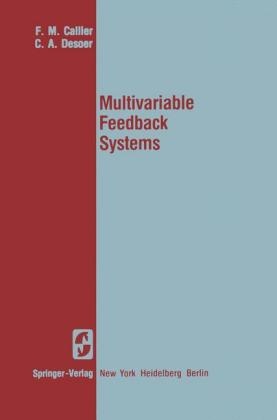Read more
This volume is the result of our teaching in the last few years of a first year graduate course on multivariable feedback systems addressed to control engineers. The prerequisites are modest: an undergraduate course in control (for acquaintance with concepts, terms, and design goals) and a senior-graduate course in linear systems. This volume covers lumped linear time-invariant multi-input multi-output systems with strong emphasis on control problems. The purpose is to provide a rapid introduction to some of the main and simpler results of control theory and to provide access to the current literature. Note that our exposition pays particular attention to the time-domain behavior of the systems under study. Note also that we cover neither optimization nor stochastic systems since these topics are treated in separate courses. As is obvious from its abundant literature, multivariable control is a very rapidly developing field. Consequently, we have no expectation that our exposition will become definitive; however, we hope that our efforts will be found useful. To get an idea of the contents, we suggest reading carefully the table of contents and the introduction of the chapters. Roughly, Chapter 1 is an introduction to feedback issues in a multivariable context (desensitization, large gain, singular values, etc. ). Chapters 2 and 3 cover the mathematical tools for handling transfer functions as polynomial-matrix fractions and for studying systems described by polynomial matrices. Chapter 4 uses these tools to cover the general theory of interconnected systems.
List of contents
1. On the Advantages of Feedback.- 1.1. Introduction.- 1.2. Singular Value Decomposition of a Matrix.- 1.3. Large Loop Gain.- 2. Matrix Fraction Description of Transfer Functions.- 2.1. Introduction.- 2.2. Polynomials, Euclidean Rings, and Modules.- 2.3. Polynomial Matrices.- 2.3.1. Divisors, Coprimeness, Rank.- 2.3.2. Elementary Operations on Polynomial Matrices.- 2.3.3. Elementary Operations and Differential Equations.- 2.3.4. Standard Forms: Hermite and Smith Forms.- 2.3.5. The Solution Space of D(p) ?(t) = 9 t ? 0.- 2.3.6. Greatest Common Divisor Extraction.- 2.4. Matrix Fraction Descriptions of Rational Transfer Function Matrices.- 2.4.1. Coprime Fractions.- 2.4.2. Smith-Mcmillan Form; Relation to Coprime Fractions.- 2.4.3. Proper Transfer Function Matrices.- 2.4.4. Poles and Zeros.- 2.4.5. Dynamical Interpretation of Poles and Zeros.- 2.5. Realization and Polynomial Matrix Fractions.- 3. Polynomial Matrix System Descriptions and Related Transfer Functions.- 3.1. Introduction.- 3.2. Dynamics of a PMD; Redundancy.- 3.2.1. Dynamics of a PMD.- 3.2.2. Reachability of PDMs.- 3.2.3. Observability of PMDs.- 3.2.4. Minimality, Hidden Modes, Poles, and Zeros.- 3.3. Well-Formed and Exponentially Stable PMDs.- 3.3.1. Well-Formed PMDs.- 3.3.2. Exponentially Stable PMDs 121 3.4. Transfer Functions: Right-Left Fractions; Internally Proper Fractions.- 4. Interconnected Systems.- 4.1. Introduction.- 4.2. Exponential Stability of an Interconnection of Subsystems.- 4.3. Feedback System Exponential Stability.- 4.4. Special Properties of Feedback Systems.- 5. Single-Input Single-Output Systems.- 5.1. Introduction.- 5.2. Problem Statement and Analysis.- 5.3. Design.- 6. The Closed-Loop Eigenvalue Placement Problem.- 6.1. Introduction.- 6.2. The Compensator Problem.- 7. Asymptotic Tracking.- 7.1. Introduction.- 7.2. Theory of Asymptotic Tracking.- 7.3. The Tracking Compensator Problem.- 8. Design with Stable Plants.- 8.1. Introduction.- 8.2. Q-Parametrization Design Properties.- 8.3. Q-Design Algorithm for Decoupling by Feedback.- 8.4. Two-Step Compensation Theorem for Unstable Plants.- Epilogue.- Appendices.- A. Rings and Fields.- B. Matrices with Elements in a Commutative Ring IK.- C. Division of a Polynomial Vector on the Left by a Polynomial Matrix.- References.- Symbols.

